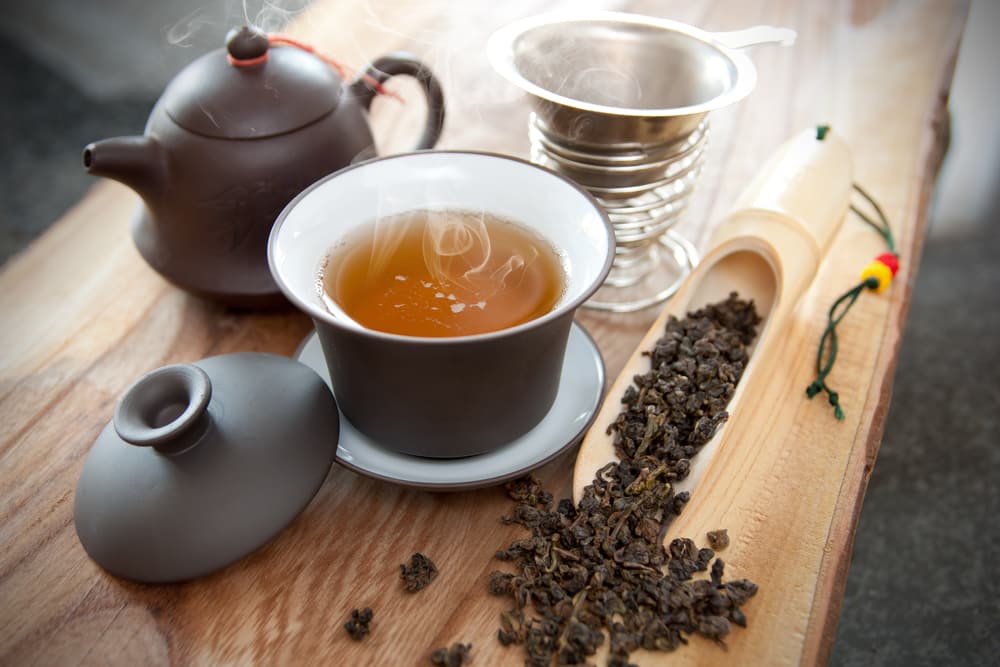
Tea is one of the most consumed beverages out there, ranging from boba tea to iced black tea or steaming hot green tea. In simpler words, there is a never-ending range of teas available in the market with distinct flavors and characteristics. So, if you like to try out different types of teas, the jasmine vs. oolong tea comparison in this article will help you select the right one that suits your flavor palette.
Differentiating Between Jasmine vs. Oolong Tea
Oolong Tea
Oolong tea is available in colors ranging from black to deep green. Many people don’t know this, but oolong tea goes through partial fermentation, which is the primary reason behind floral yet earthy flavors. However, the darker varieties of oolong tea have butter, evergreen, and smoky notes. In simpler words, it has a vast flavor range, and it completely depends on the oxidation level. Keep in mind that oxidation can change the tea leaf’s color as well as the flavor.
For instance, light green tea has a sunny, sweet, rich, and fresh flavor, while warmer green tea has a warm spice and woodsy notes. On the other hand, dark green tea has an intense, thick, and robust flavor. In addition to this, the taste depends on the preparation and quality of leaves, which is why you must select the right vendors to enjoy a natural flavor. As far as the caffeine is concerned, there is caffeine in oolong tea, but it’s limited to 10mg to 60mg for an eight-ounce cup.
Oolong tea has an array of health benefits since there are antioxidants, minerals, and vitamins, such as magnesium, calcium, potassium, and more. For instance, regular consumption of this tea reduces the risk of catching type-2 diabetes and heart issues, and works great for reducing anxiety. In addition, many people enjoy the stress-relieving experience. However, this tea can be hard to find as it’s native to China.
As far as the making is concerned, the tea leaves are put under the sunlight for wilting, which are then bruised to allow partial oxidation. Depending on the oxidation time, the color of the tea leaves will change, and it will heavily impact the flavor.
Jasmine Tea
Jasmine tea is one of the most flavorful teas out there and has minimal oxidation. It is usually pan-fried to develop a floral tone. In addition, minimal oxidation helps retain the maximum antioxidants, which helps improve the immune system. As the name suggests, this tea is flavored with real flowers, which promises a soothing and sweet fragrance. In particular, the tea’s flavor indicates the flavor of the flowers.
It wouldn’t be wrong to say that it has a sweet aroma (it might even remind you of jasmine perfumes). However, the floral and sweet flavor is pretty subtle and delicate. However, the freshness of the tea leaves depends on the brand (the organic tea tastes the best). It is usually made by adding some into green tea, resulting in a sweeter blend, and many people add jasmine tea to black tea to fix the bold notes and brighten the flavor.
The jasmine tea is available in black as well as green versions. The green version has a bold yet sweet flavor, while the black tea version has bitter notes. On the other hand, if you add jasmine tea to white tea, it adds a feminine flavor. Jasmine tea gets its flavor from the flower blossoms, which is why the flavor highly depends on the flowers. However, keep in mind that the jasmine tea is totally caffeine-free, and even if the tea has some caffeine, it’s added through the base tea.
The flower buds tend to have the most robust flavors, but the trick is to pick the flowers just before the blooming phase. The jasmine tea leaves are prepared when the jasmine flowers are closer to the blooming phase – there is actually an extensive scenting process to achieve a rich and natural flavor. As far as the benefits are concerned, it helps with weight loss, promotes oral health, strengthens brain function, and promises better cardiovascular health.
The Bottom Line
On a concluding, both these teas are delicious, but jasmine tea is a suitable choice for people who don’t want caffeine, but oolong tea has a minimal level of caffeine. So, choose according to your caffeine needs!
